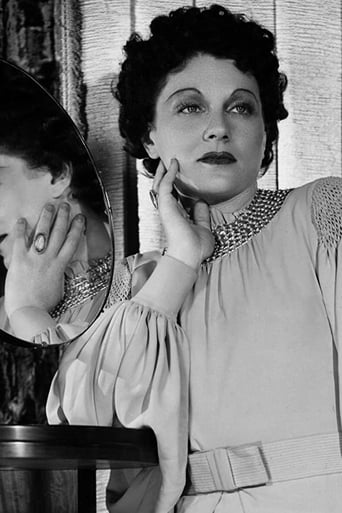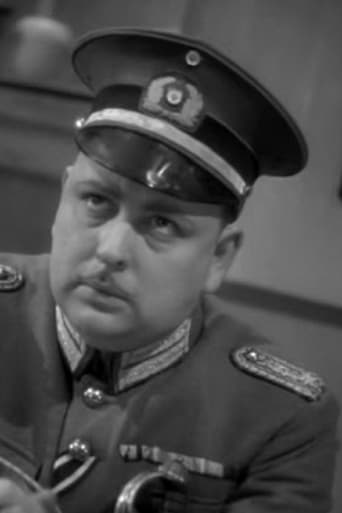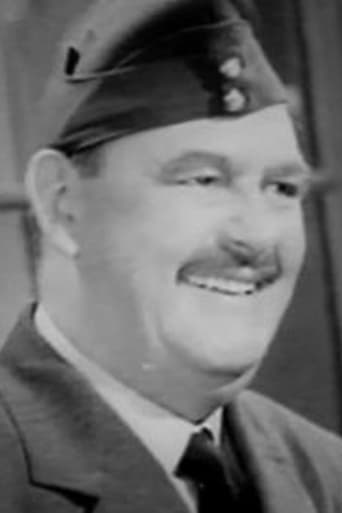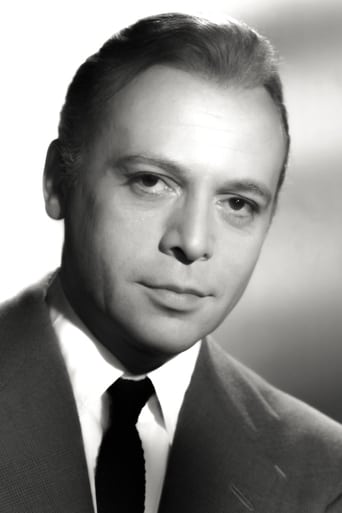ChanFamous
I wanted to like it more than I actually did... But much of the humor totally escaped me and I walked out only mildly impressed.
Hadrina
The movie's neither hopeful in contrived ways, nor hopeless in different contrived ways. Somehow it manages to be wonderful
Keira Brennan
The movie is made so realistic it has a lot of that WoW feeling at the right moments and never tooo over the top. the suspense is done so well and the emotion is felt. Very well put together with the music and all.
Dana
An old-fashioned movie made with new-fashioned finesse.
Alex da Silva
A small number of people are resident at the "Hotel Reserve" which is meant to be in France but is clearly on a studio set. It is up to one of the residents, Peter Vadassy (James Mason) to find out which guest is a Nazi spy. The cast are split into 2 groups. First of all, there are the good actors who portray interesting characters - Emil Schimler (Frederick Valk) - bad/good guy with a secret?, the female hotel owner - bad/good girl?, Andrew Roux (Herbert Lom) - bad/innocent guy? and the main police inspector - a good guy that knows more than the audience/James Mason. Set against this are the rest of the cast who are all buffoons, especially the Major (Anthony Shaw) and the fisherman (David Ward) who play their roles for laughs and who are never funny. There is also a pointless role for a French policeman who follows Vadassey around and he plays for humour. He is also not funny...............a mention must also go to Lucie Mannheim as the romantic interest for James Mason. She is dreadful and it is criminal that she is second-billed in this film. Neither her air-time nor her acting skills merit this lofty position. James Mason is OK and the film is a time-passer. Nothing more.
howardmorley
I only rated this 5/10 and would have expected it to be a 'B' feature before the big film, had I been in a cinema in 1944.As other reviewers have pointed out it looks like it was steered by a committee of directors to wit, Lance Comfort, Mutz Greenbaum (as Max Greene) and Victor Hanbury who fell over each other and got into a terrible mess.My first criticism is the film was obviously studio bound and had a claustrophobic feel to it throughout, especially for a film which purported to be set in the south of France.I know it was war time but Cornwall in the summer would have made a good substitute location.In that same year 1944 "Love Story" was made on location in Cornwall and London which added to the reality of the story.Other reviewers mention Hitchcock who was partial to actual exterior locations when the film demanded it.I suppose the producers were constrained in wartime by budgets.My second criticism was the unconvincing sets, never more noticeable than when James Mason climbs a ladder to a rooftop and you see what purports to be an iron ladder bend and sway - one for continuity.I do like a bit of the authentic language spoken, in this case French which was noticeable by its absence.A few "Messeur", "Mesdames" and "Merci" thrown in just will not do.In this regard the scriptwriters should have made a bigger part for Patricia Medina whose father was Spanish, hence her surname and as a linguist she could also speak French & Italian.I liked the eye candy of Lucy Mannheim (James Mason's German sounding girlfriend) but as stated by others she was not given enough of the script to establish her character.With a few deft opening scenes in "The 39 Steps" (1935) Hitchcock makes Lucy Mannheim's character much more memorable even after we have seen the charms of Madeleine Carroll.My third main criticism is that for a thriller and "who-done-it" it was curiously lacking tension and excitement, which brings me back to my review title.It certainly did not lack a quality cast James Mason, Herbert Lom, Raymond Lovell, Lucy Mannheim etc. so I can only blame the scriptwriters and directors for its flat outcome.
Neil Doyle
JAMES MASON finds himself in a very Alfred Hitchcock situation in HOTEL RESERVE, that of an innocent man suspected of being a spy and having to prove his innocence by cooperating with the authorities to nab the real espionage agent. Sound familiar? Hitchcock used the same sort of innocent man frame-up in many films, most notably NORTH BY NORTHWEST.But what's missing here, as others have commented, is that Hitch's expert touch is missing from the direction. The plot even has an exciting ending where hero and villain are atop a tall building and we know which one is going to meet his demise--but it's rather well done, except that Hitchcock would have thrown in some added touches for an even tighter bit of suspense.Mason is very good in the leading role as the man caught in what appears to be a trap, while staying at the Hotel Reserve, where he must survey all the other guests to determine which one may have gotten their hands on his camera by mistake. The plot never becomes too overburdened with subplots (as some of these thrillers do), so it's all told in a brief hour and nineteen minutes.HERBERT LOM is effectively cast as the hot-headed villain, with PATRICIA MEDINA not having much to do as his docile wife, and LUCIE MANNHEIM makes almost no impression at all as Mason's love interest, providing little more than a pretty face and a blank stare.The improbable entrapment of the killer by police is a minor quibble, as is his method of temporary escape--but other than that, it's an acceptable spy thriller.Summing up: Taut and tense with occasional bits of humor, it establishes why James Mason became a favorite with British and American audiences.
Roger Burke
Another old goodie from RKO studios, in the era when they were churning out spy melodramas almost by the dozen.I decide to watch this one for two main reasons: first, it has a still young-looking James Mason, appearing in his thirtieth movie (he first appeared in 1935) and there's also one of the heavies of the thirties and forties, Herbert Lom, once again showing his under-rated acting ability.I was also surprised at the great camera work: some truly imaginative interiors, great use of shadows and lighting, and quite an interesting denouement between the two men at the top of a building, again with some brilliant camera work. The setting was supposed to be in 1938 southern France, but in wartime, one makes do with the back lot at Pinewood; unhappily, that was all too obvious. There are other technical faults and shortcomings but just pretend you're in the local Palace on a bleak afternoon in 1944 London.The story about a young man, Peter Vadassy (Mason), being framed for espionage seemed to me a bit weak, at the outset: the local gendarmerie allow him to go free so that he can help trap the real spy, after he proves, sort of, that he is not the guilty party. Why then would the director of French Naval Intelligence rope in a stranger to help do their work? Ah, well, that's a bit of the puzzle that all comes together at the end, and very nicely done too... Of course, that's what one should expect from an Alistair Maclean novel, I reckon.Given the times, it's a good cast and the acting is generally good, even if the characters are a bit stereotypical. Hey, it was wartime, so it was good propaganda, I guess...At 85 minutes, it was a nice break after a busy day and the office...my PC! It won't appeal to the younger set, of course, but RKO and spy-story enthusiasts, who probably tend to be a bit older, would enjoy this one. I did.




